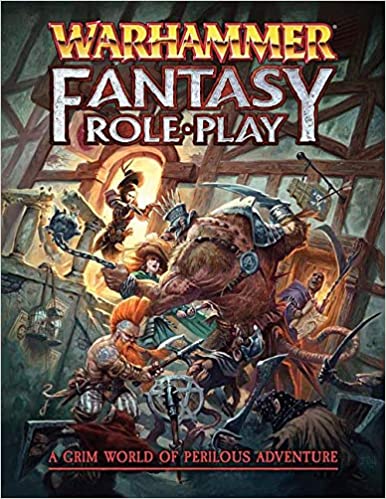I started to feel that I didn’t know roleplaying games well enough so I came up with the plan to read a roleplaying game corebook for every year they have been published. Selection criteria is whatever I find interesting.

Warhammer Fantasy Role-Play has a somewhat convoluted publishing history. After the first and second editions, the game jumped to Fantasy Flight Games in the U.S. and received a third edition that was controversial among the player base. I liked it but nevertheless the 4th edition is based on the 1st and 2nd editions and ignores the new ideas presented in the 3rd.
The 4th edition came out in 2018 but the copy I read is from 2020.
Warhammer Fantasy Role-Play is a system-heavy low fantasy roleplaying game set in Warhammer’s Old World setting. The player characters adventure in the Empire, modeled after late medieval Germany. Compared to earlier editions and other Warhammer material, the 4th edition feels slightly tamer in tone, although there are still snotlings and diseases aplenty.
The game’s system is something of a marvel. The identity of an old roleplaying game with many editions is as much caught in the system as it is in the concept and ideas. A common comment about Dungeons & Dragons 4th Edition was that it didn’t feel like D&D, an issue which led to the 5th edition which was closer to the classic D&D model. Warhammer Fantasy Role-Play 4th Edition is clearly very aware of this and the system feels like an arcane throwback to a bygone era of design, in good and bad. It’s fun to puzzle out its strange intricacies but even just the process of character creation is bizarrely complicated.
One of the things I’ve always liked about the game is the careers which here take the place of character classes. They represent people’s livelihoods in a way totally alien to other fantasy games, such as D&D. You can play a servant or a rat catcher and between adventures your character is assumed to be making money in their day job. In this sense, Warhammer Fantasy Role-Play is a game where adventurers are freelancers, ordinary folk for whom adventure is a side hustle.
For me, the most interesting part of the game’s system concerns what the characters do between adventures. There’s a great mechanism for handling money: A character must take a separate action to take their money to the bank. If they don’t specifically save their money, the game assumes that they just fritter away any extra coinage they have in their pockets before the next adventure comes around. I love this detail. It communicates so much about what kind of people this game is about.